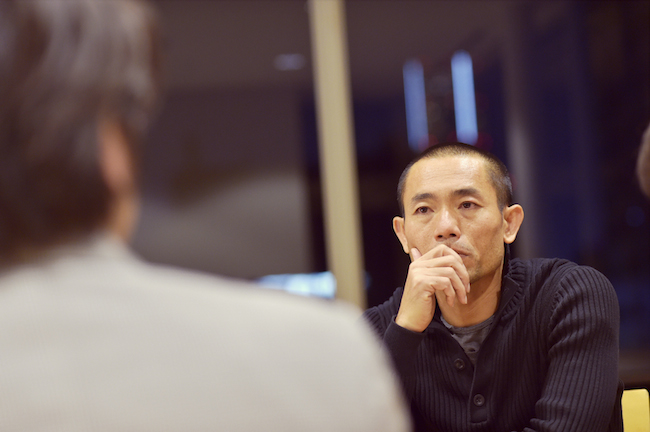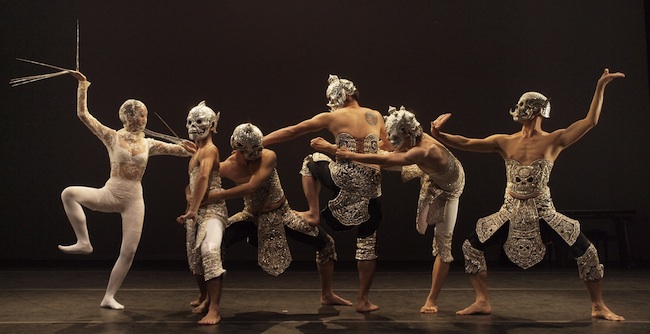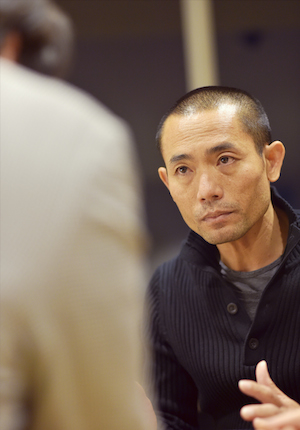Relationship with Audience
- How do people who are familiar with Thai classical dance receive your works?
Pichet: They think the form or concept of the classical dance shouldn't be altered, so when they judge what I do, they only say, "This is not culture." No theory, no knowledge: the only thing they care about is whether it is "culture" or not. They see Thai dance not as a dance art but as a "culture." So they go, even at the slightest deviation from the traditional form, "It's wrong!"
- Support for traditional performing arts not by looking into the quality but by just preserving the form: that can be found everywhere.
Pichet: Traditional performing arts don't communicate with audience, don't offer professional opportunities, and don't sell tickets. So no one thinks about its quality and meaning. Culture that was originally established for kings cannot be relevant in our time just by preserving.
- That might be true for Asian traditional performing arts in general.
Pichet: They originally developed as rituals for Buddhism, royal families, or other things. In the past, people in Indonesia or India didn't go to see "dance." The dancers were playing the roles of gods, and people went there to meet the gods.
- Japan also has traditional performing arts like bugaku, noh, etc., but very few people try to radically renew them as you do. In that sense, what you have been doing can be a model for various Asian dances.
Pichet: But there are other people who have been working like I do in Asia. Eko Supriyanto*4 Sardono Kusumo*5 , Lin Hwai-min*6 )...
*4 Indonesian contemporary dance artist who has been internationally active.
*5 The most prominent avant-garde dance artist from Indonesia.
*6 The leading figure in Taiwanese modern dance, and the artistic director of the internationally acclaimed Cloud Gate Dance Theatre.

- Young classical dancers have gradually been gathering around you. Do you feel that more people have been sympathizing with your activity recently?
Pichet: No, I don't... I have a company, but there are just five people. We have been performing a lot, so more people could have joined. It must take time to gain sympathy. The difficulties are in many levels: society, class and culture. I have been doing something that people who had learned Thai classical dance have never done, and I haven't studied at any dance school. In Thailand, teachers of the classical dance are usually graduates of the College of Dramatic Arts. I am in an unprecedented position because I didn't graduate from that kind of traditional school. The Fine Arts Department has never recognized what I create. They see me as a heretic. Apparently, they don't know how to deal with me because I'm too new to them. Therefore, there haven't been new tendencies in dancers, but there are in audience instead. We see a lot of students and young people in the audience. They get interested, come to the show, and put up questions about or reconsider traditional culture. I mean the possibility of reviving traditional culture is becoming visible.
- Interest in the classical has been stimulated by heretical expression.
Pichet: They had never looked at the traditional dance as something that can be beautiful or interesting. They just thought it was dull and boring.
- What kind of things do you think they are familiar with?
Pichet: They are ordinary young people who, for example, enjoy Western pop music.
- What makes them come to see your shows?
Pichet: Firstly, my pieces communicate with audience. For instance, I don't play a god. I don't play anything that is beyond their imagination, and I perform wearing clothes that they can be wearing. I mean audience see my performance and understand that I am a human being as they are. They are also familiar with the stories that I tell. Black & White talks about how to keep balance in your life, and Tam Kai can be danced by anyone. What audience see is not distant from their lives. And the most important thing should be that I am friendly to everyone and don't behave like a dance master. The hierarchy between the teacher and students is considered very important in the "culture," but once you behave like a teacher, a distance is created between you and students and you become awkward at communicating.

Photo: Weerana Talodsu
- Do people who usually see contemporary theatre or Western contemporary dance come to your shows too?
Pichet: Yes, but people who are interested in traditional culture come too. There are also people in their 60s and 70s in the audience. They require quality firstly, and a new type of narrative secondly.
- So there has recently been a certain range of audience that receives stimulation from your pieces in Thailand.
Pichet: Yes. The number of audience has drastically increased in ten years. When I first performed I am a demon, there were only three people. Now 200 seats are sold out for one performance. I performed in Bangkok two weeks ago, and the three 180-seat shows were sold out. But I have recently been performing only once or twice a year in Bangkok. I perform abroad more.
- If it can be said that you had mainly performed abroad and there hadn't been audience in Thailand, can it be said that the balance has changed?
Pichet: The balance has become better, but I still get bigger response abroad. Understanding of contemporary art is still shallow in Thailand, so people don't go so far as to purchase tickets to see a show. Seeing contemporary art is considered different from seeing classical art. There has not been effort to acquire knowledge of and participate in contemporary art. Commercial shows are popular. In theatre, a hero, a villain and a clear story are expected. So audience's taste hasn't been cultivated yet. There is no one who is capable of explaining the difference between classical art and contemporary art. Information and education are needed in the society.
On the Creation Environment
- You had had only three audience members, but now you have more than 500. Your position might be still relatively marginal, but I think your presence in the society has been increasing. Have there been changes in terms of the creation environment and grant opportunities?
Pichet: There is influence on the creation environment. Audience have more expectation than before: they want to see really interesting things. So creations are exhausting, and a process for one piece has been becoming longer and longer.
- Stronger, but positive pressure is on you.
Pichet: Yes. It is not so strong as to make me collapse though...
- What about financial support?
Pichet: I have never received a grant from the Thai government. We might be going into a sensitive issue (laughs). The government doesn't support contemporary art in the first place. There are three conditions for becoming eligible to receive governmental support. One is that the content of your expression has to be related to the king. Secondly, it has to be related to Buddhism. Thirdly, it has to be related to support for children. If you meet one of the three conditions, you can receive the governmental support. A piece titled Tam Kai can never get it. A chicken doesn't have anything to do with the government.
- Then, you are financially supported mostly by foreign funds?
Pichet: I don't perform pieces produced with foreign money in Thailand.
- Are your domestic shows and overseas shows different?
Pichet: The contents are the same sometimes, but the domestic shows are poorer in scale, lighting, etc. There is not a facility like Kanagawa Arts Theatre in Thailand. Foreign people tend to think that Thailand is a developed and rich country where decent theaters and facilities exist, but that's not true... That's why I built my own studio.
- What do you do at your studio?
Pichet: Last year I invited four or five artists as well as two or three foreign artists for the performance. Not really a festival, but a two-week program. Shows at my studio are offered to neighbors for free.
- What kind of audience do you have there?
Pichet: Totally local people. Construction site workers, peddlers, all kinds of people. My venue is not in the central area of Bangkok but in Thon Buri District across the Chao Phraya river, where 60% of the residents are Muslims. I want to make the venue a place where both Muslims and Buddhists can come. And I want the local people have opportunities to get familiar with art.
- What have the construction site workers, for instance, told you about the shows?
Pichet: I think they didn't intellectually understood but enjoyed the fact that they had new experiences. That stimulates them into interest in art. They are happy that the thing called "art" is close at hand, which I think is very important. Probably they don't understand immediately, but by seeing shows again and again, they realize that art is absolutely not beyond their reach.







